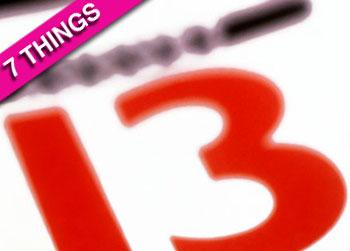Seven Things You Didn't Know About Friday The 13th

April 13 2012, Published 4:00 a.m. ET
It's considered the unluckiest day on the calendar, associated with mishap, misfortune, mistake and just plain misery.
Yes, in case you haven't noticed, today is Friday the 13th, and we're sure you're aware of all the negative connotations that come when you combine the day and number.
That said, RadarOnline.com is going to take a closer look at the mystique behind the infamous date, and how it came to be that way, with seven things you didn't know about Friday the 13th.
7. Yes there's a formal term: People who fear the day suffer from a condition doctors have labeled "Paraskevidekatriaphobia." The root of the word is a combination of Frigga (the Norse goddess who the day of the week is named for) and triskaidekaphobia, which means fear of the number 13.
6. Unlucky 13: There are many theories as to why 13 is considered a bad number, to varying degrees of believability. Among them include the notion that since 12 signifies wholeness for many things (clocks, months of the year, the tribes of Israel, Apostles of Jesus, constellations in the Zodiac), 13 upsets that balance. Experts estimate 85% of qualifying buildings do not designate a 13th floor (calling it the 14th floor, instead) because of the stigma attached to the number.
5. Unavoidable: Mathematicians have figured out that every calendar year will have at least one Friday the 13th. In 2012 -- already fraught with Armageddon anxiety as the Mayan calendar expires -- we've got three of them, with the next one coming in July.
3. Checkered Past: Living up to its name, a lot of bad things have occurred on this date in history: Many believe Jesus was crucified on this day; in 1307, French monarch Philip IV tortured hundreds on monks he felt were guilty of heresy; in 1970, the Apollo 13 was badly hindered when a liquid oxygen tank burst; in 1992 a Turkish earthquake killed almost 2,000 citizens, leaving another 50,000 with no place to live.
2. Fear Factor: North Carolina's Stress Management Center and Phobia Institute reported in 2004 that anywhere from 17 to 20 million Americans will alter their plans -- avoiding flights, work, and in extreme cases, leaving the house -- so as not to tempt fate on the allegedly unlucky day. The overall damage: $800-$900 million in lost revenues, the Institute said.
1. Even The Rich & Famous Can't Avoid It: Names famously associated with their distrust of the day known include former President Franklin Delano Roosevelt, and industrialists Paul Getty and Henry Ford. Not bothered by it? Songstress Taylor Swift, who has the number 13 on the back of her Twitter ID (TaylorSwift13). She tweeted Friday, "I love it when it's the 13th. Clearly."



